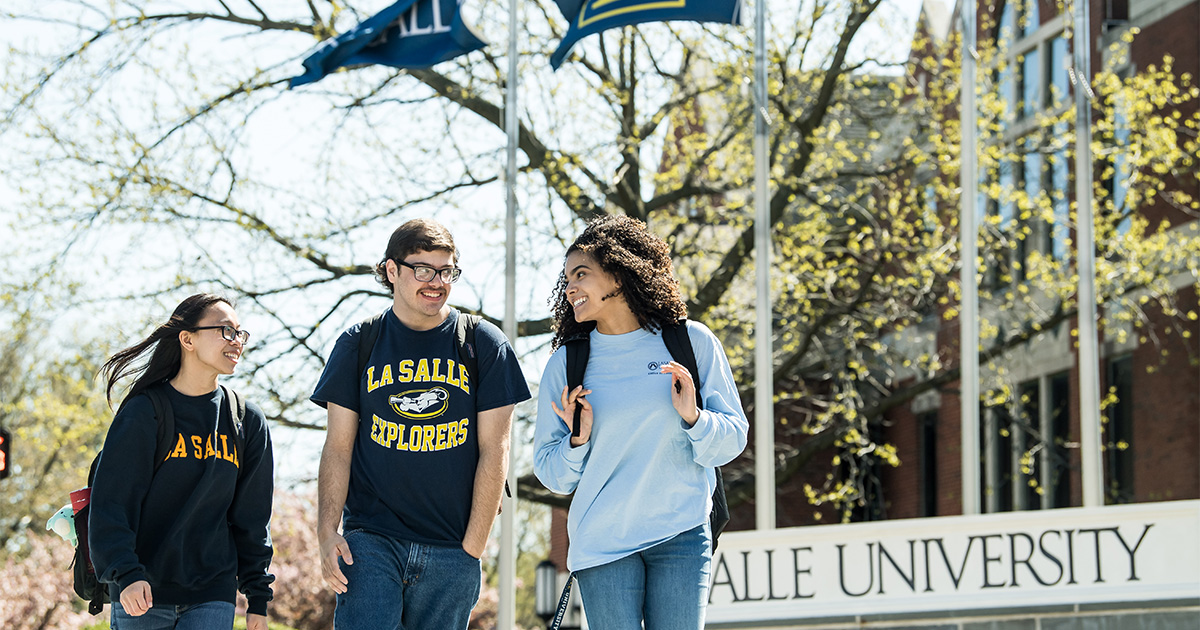La Salle University
La Salle awarded $2.2 million grant to support student success
The grant, awarded by the U.S. Department of Education, will fund a comprehensive project of institutional enrichment for the student experience.

La Salle University received a big boost towards its goal of institutional excellence with the recent announcement of a $2.2 million, five-year Title III Strengthening Institutions Program (SIP) grant from the U.S. Department of Education (USDE).
The grant will fund a comprehensive project titled “Advancing the La Salle Experience” that integrates a variety of strategies designed to address:
- Retention and graduation rates;
- Academic proficiency in targeted courses;
- Student support services and professional development opportunities for an increasingly diverse student population with evolving needs;
- Use of data and technology; and
- Enrollment amid a competitive environment for recruitment of fewer college-bound students.
“With this grant, we have a remarkable opportunity to enact transformational change on behalf of our commitment to student success,” President Daniel J. Allen, Ph.D., said. “The self-reflection undertaken as part of the grant submission process was vitally important to identify the necessary steps to reshape the student experience.”
The grant awarded through the USDE’s Office of Postsecondary Education (OPE): Higher Education Programs (HEP) and its Title III Strengthening Institutions Program (SIP) has three overarching goals:
- Leverage the Lasallian tradition of relationship-based education and inclusivity to deliver a transformational, holistic, mission-focused student experience;
- Provide comprehensive support to improve student outcomes and enhance University quality; and
- Achieve greater fiscal stability.
“This project is intended to improve services to all students and to enhance the skills of faculty and staff,” Provost Shivanthi Anandan, Ph.D., said. “Over the course of the five years there will be a number of key activities identified in the grant proposal that will be achieved, including the establishment of first- and second-year experience courses, implementation of evidence-based academic supports, establishment of a data governance framework and data catalog, and updating and/or creating standard reports and dashboards for enhanced data access.”
The grant award comes as the University is kicking off its new strategic plan, Ascend 2028, and will speak directly to five of the six strategic pillars.
To put the proposal in place, Anandan appointed a team that included staff responsible for institutional research, information technology, teaching and learning, and student success as well as department chairs and faculty. Comprehensive analyses of data including information from an extensive consultant-led self-study conducted in 2019 and an InsideTrack analysis prepared in 2021 were part of the process. The grant proposal was submitted in spring 2023.
Before hiring a full-time project director, Assistant Provost Teri Ceraso, M.A., who served as the point person and lead on the development of the grant proposal, will spearhead the grant launch along with Assistant Vice President of Information Technology Alicia Stonesifer, ’02, M.S. ’07, and Executive Director of the Center for Academic Achievement Phenix Frazier Badmus, M.Ed. They will be further supported by key university leaders and influencers who will serve on a La Salle Experience Committee to provide oversight/guidance and continue their involvement and vested interest in the project. Among the campus partners that will be directly involved are: Institutional Research, the de La Salle Institute, the Registrar’s Office, the English Department, the Career Center, Student Development and Campus Life, and the FYE and Core Curriculum Committees.
“The Title III SIP grant is in step with La Salle’s core values and provides us with a wonderful opportunity to work together across campus in fulfillment of our mission,” Ceraso said. “Hopefully, when all is said and done, we will have moved the needle in terms of retention and graduation, better served our students, and addressed current infrastructure limitations.”
The momentum started by the grant will be continued in the long term through financial planning built into the University’s annual budget process. It will also be maintained by building faculty, staff, and student competencies that enable more students to persist and graduate. Additionally, infrastructure improvements in terms of data and technology, and enhanced training using train-the-trainer models will enable the University to scale back certain costs and ensure sustainability.
La Salle’s Advancement Office will also solicit private funding as needed to institutionalize improvements, and through the annual Day of Giving, seek funds that the deans and president can direct to support strategic initiatives such as those included in the project.
“At the end of the five-year grant, we are anticipating improvements on retention rates, graduation rates, and enrollment stability,” Anandan said. “Additionally, we expect to receive feedback from students that they are getting higher levels of engagement through work with success coaches that will help them define career goals and educational purpose and to better serve diverse student populations. When they graduate, we want to make sure they feel high levels of satisfaction with La Salle.”